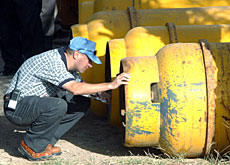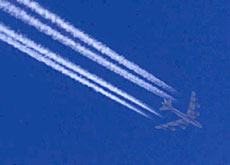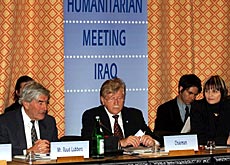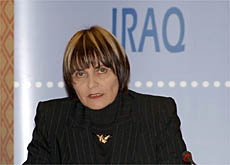Swiss say it’s “too early” for war

The Swiss government has told the United Nations Security Council it fears the consequences of a military strike on Iraq, and says the use of force is premature.
Switzerland also said it would limit the use of Swiss airspace to humanitarian flights, at the same time as ruling out asylum for the Iraqi president Saddam Hussein.
Pierre Helg, Switzerland’s deputy permanent representative to the UN in New York, told the Security Council on Wednesday that force should only be used once “all peaceful means have been exhausted”.
Helg’s statement came as the Swiss cabinet revealed it had rejected a United States request for military flights over Switzerland.
The ban on military aircraft in Swiss skies was taken in an effort to protect Swiss neutrality.
“Should the Security Council approve an armed conflict [by means of a second resolution], the cabinet will decide fly-over rights on a case-by-case basis,” said cabinet spokesman, Achille Casanova.
The cabinet also categorically ruled out providing asylum in Switzerland to Saddam, his family and close associates.
“The cabinet feels Switzerland would be poorly served by harbouring people accused of gross human rights violations,” Casanova said.
The idea of offering sanctuary to Saddam to avert a possible war was put forward by a former Social Democrat parliamentarian. It then became an issue of debate in the media and among politicians.
Swiss plead for time
Helg’s address – Switzerland’s first detailed statement to the Security Council on the Iraq crisis – also highlighted last weekend’s humanitarian conference held in Geneva.
More than 30 countries, as well as some 20 humanitarian organisations attended the meeting, launched by the Swiss foreign minister, Micheline Calmy-Rey last month.
“The participants acknowledged that an armed conflict… would very probably have grave consequences for the local civilian populations, not only in Iraq where the situation is already precarious, but also in neighbouring countries,” Helg said.
He added that Switzerland did not underestimate the risk of weapons of mass destruction.
“However, we are deeply concerned about the prevailing situation in the region… and the impact on this situation of a violent shock wave provided by hasty military action.”
Helg said Switzerland accepted the argument that a willingness to use force was needed to strengthen the position of UN inspectors.
UN must give green light
“The Security Council must continue to persevere with determination. And if this option fails, we recall that in any case the use of force must be authorised by a Security Council resolution,” he said.
“Iraq holds the key to solving this crisis,” Helg said.
“Switzerland appeals to the Iraqi government to act in the true interests of its country.”
Case-by-case
Blaise Godet, an ambassador responsible for relaying cabinet’s airspace decision to the Americans, told swissinfo that the Swiss reserved the right to make case-by-case decisions.
Godet said US requests to use Swiss airspace would consider whether the flights were of a military or humanitarian nature.
“[We will consider whether] we have a medical evacuation, do we have an intelligence aircraft? [And] does it contain troops?” Godet said.
Other factors would include the “general attitude observed by the allies” and the number of countries participating in war.
“All these elements may play, in due time, a role and may be instrumental in shaping the decision making process of the Swiss [cabinet].”
swissinfo, Jacob Greber

In compliance with the JTI standards
More: SWI swissinfo.ch certified by the Journalism Trust Initiative



You can find an overview of ongoing debates with our journalists here. Please join us!
If you want to start a conversation about a topic raised in this article or want to report factual errors, email us at english@swissinfo.ch.